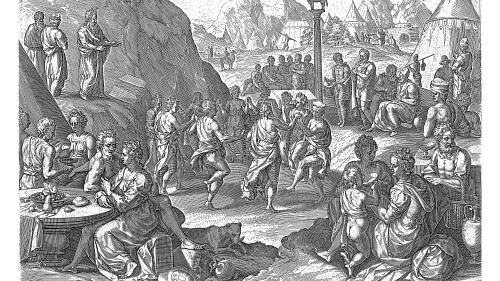Today, the world watched in horror as Hamas militants in Gaza paraded in glee the bodies of four Israeli civilians—three of them a mother and her two infants. Rather than universal condemnation, we saw cheering, children encouraged to revel in the spectacle, and an atmosphere of triumph that shattered any last illusions we might have harbored. The barbarity left Israelis, global Jewry, and many others who were already familiar with the depravities of Palestinian nationalism around the world in a state of renewed shock. Yet, for many of us, it should force an overdue conclusion: the Palestinian national cause, as conceived and developed over the last half-century, has become irredeemable.
A year ago, I allowed myself the optimistic thought that perhaps a different Palestinian identity might yet emerge: one divorced from the antisemitic vitriol, the revolutionary Third-Worldist fanaticism, and the nihilistic death-cult threads introduced in the 1960s by global leftist intellectual currents. I tried, despite my doubts, to imagine a future in which Palestinians could somehow find a new identity built on pragmatic coexistence or even form a civic ethos of their own, unshackled from the destructive impulses that have repeatedly manifested in violence. Today, those hopes reach their end.
The barbarity left Israelis, global Jewry, and many others who were already familiar with the depravities of Palestinian nationalism around the world in a state of renewed shock. Yet, for many of us, it should force an overdue conclusion: the Palestinian national cause, as conceived and developed over the last half-century, has become irredeemable.
The Crumbling Legitimacy of “Palestine”
The concept of a sovereign Palestinian state was, at its inception, interwoven with big ideas: anti-imperial liberation, the romance of revolution, global anti-capitalism, and the quest for national self-determination. But subsequent decades have shown that the Palestinians never grasped the viable political path. Instead, an identity was cultivated on an endless cycle of grievance, victimhood, and, all too often, terror as a method of expression celebrated and vaporized by the most depraved elite Western intellectuals, including Western, Arab, and Jewish radicals sitting at the summit of the Western culture and education. But now it should be clear that when your primary currency is kidnapping civilians and parading their remains to public cheers, you forfeit whatever moral capital a national struggle might once have enjoyed.
For decades, outside observers believed that nationhood was the necessary answer to the dispossession experienced by Palestinians after 1948. Liberals held on to the “Two State Solution,” the way one holds on to a protective magic spell rather than a proposed solution. In principle, that argument had some merit. Yet, it has failed in practice. The repeated wars, the refusal to disentangle themselves from regional power struggles or global revolutions, the refusal to accept peace deals that might have led to an orderly autonomy, and the cultural glorification of martyrdom have created a toxic personality structure that has a flag. Any attempt at constructive state-building has been ground into dust by corruption, murderous factionalism, and the unabashed worship of violence.
Why Dissolve the Project Entirely?
Some might say it is drastic, even cruel, to declare that a people’s aspiration to statehood should be abandoned. But the events we just witnessed—children paraded around corpses in broad daylight—are not an isolated atrocity but the peak of a long march of destruction. They reflect a deeper moral and cultural collapse: no meaningful leadership capable of guiding Palestinians toward a humane, tolerant society appears to exist. Indeed, the only consistent leadership visible keeps cycling back to incitement, illusions of conquest, and pride in acts that defy basic human decency.
To argue that Palestinians should be absorbed into existing states is not to remove their communal identity; it is to acknowledge that the formal structure called “Palestine” has, in practice, become a source of destruction for themselves and for the region.
To argue that Palestinians should be absorbed into existing states is not to remove their communal identity; it is to acknowledge that the formal structure called “Palestine” has, in practice, become a source of destruction for themselves and for the region. If the dream of a stable, rights-based Palestinian sovereignty were within reach, it would have emerged during at least one of the diplomatic windows over the past decades. Instead, repeated attempts have collapsed into bloodshed.
Relieving the Burden on Generations
The idea of “Palestine” has, tragically, turned into an ideological snare that captures each new generation from birth, seeding them with the promise of “liberation” that only ever seems to produce more suffering. In many Arab countries, Palestinians have lived as second-class refugees for decades, denied meaningful integration or citizenship by the very governments that proclaim solidarity. Today’s technology-rich, globally interlinked world offers other paths to personal and communal flourishing. Yet those remain blocked as long as Palestinian leadership and outside advocates keep stoking the fires of “resistance” while funded and cheered by narcissistic Westerner liberal elites and Qatari conspirators, forever condemning Palestinian children to a cycle of violence and perennial displacement.
By integrating Palestinian populations into established nation-states—be it Jordan, Egypt, or other countries where many already reside—families might finally break from the cage of perpetual grievance. They could obtain stable legal rights, access real economic opportunities, and choose to build a future unshackled from militant dogmas. Rather than continuing as pawns in a moribund dream, they could become citizens of actual countries, with all the responsibilities and privileges that status entails.








